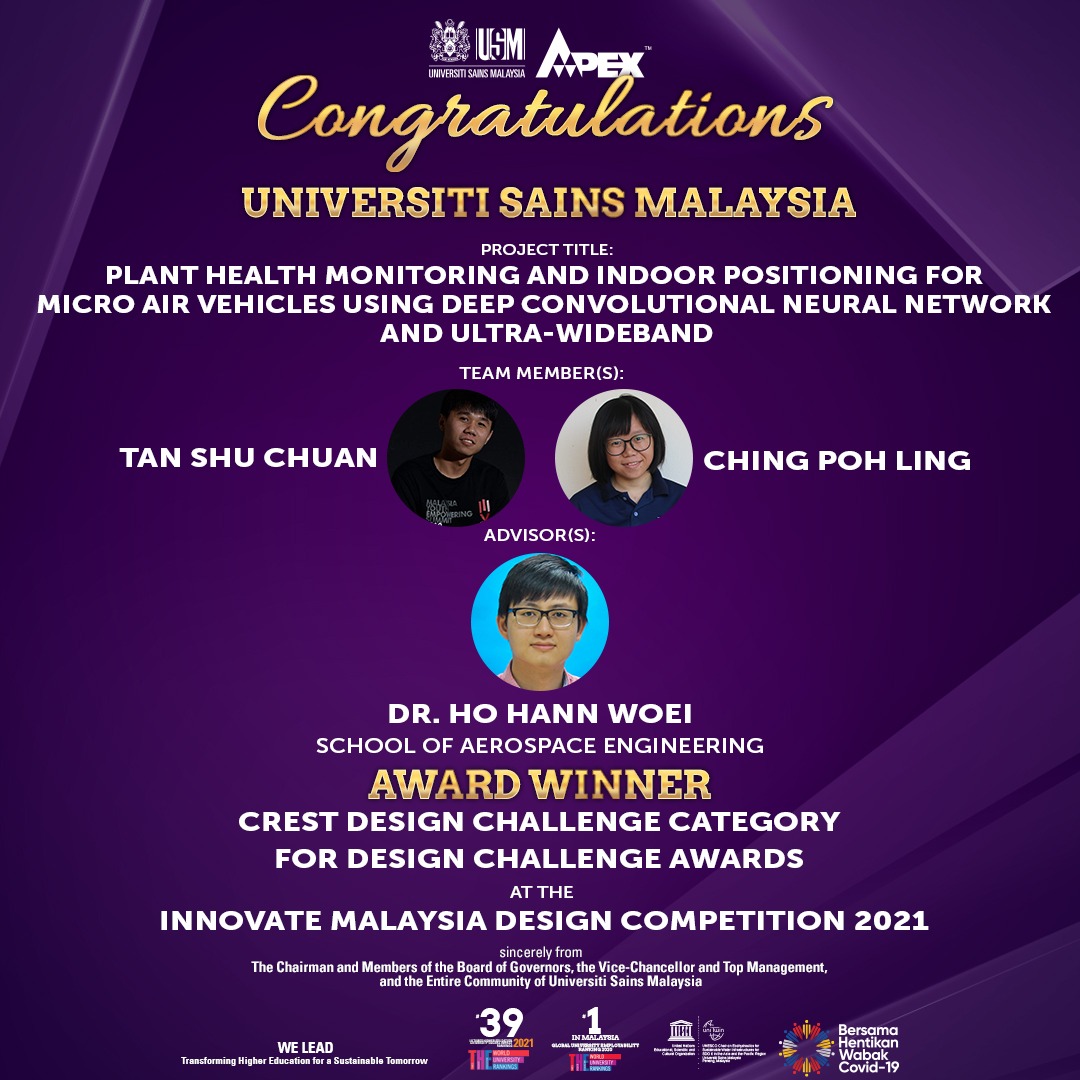USM AEROSPACE ENGINEERING STUDENTS BAG TOP PRIZE IN CREST DESIGN CHALLENGE @IMDC2021
NIBONG TEBAL, 10 August 2021 -- An affordable, palm-sized and automatic Micro Air Vehicle(MAV) to help farmers in monitoring health conditions of tissue-cultured banana seedlings in greenhouses, designed and developed by a team from the Universiti Sains Malaysia (USM) School of Aerospace Engineering, had clinched the top prize for the Design Challenge Award under the CREST Design Challenge Category at the Innovate Malaysia Design Competition 2021 (IMDC2021).

The project entitled ‘Plant Health Monitoring and Indoor Positioning for Micro Air Vehicles Using Deep Convolutional Neural Network and Ultra-Wideband’ received excellent reviews from the jury panel and was a worthy winner in the aforesaid category.
The team, comprising of two final year undergraduates Tan Shu Chuan and Ching Poh Ling, was rewarded with a prize money of RM3,000 and award certificate.
The project also earned them another award - The Institution of Engineers, Malaysia (IEM) Best Paper Award, which came with a prize money of RM1,500.
Their supervising lecturer Dr. Ho Hann Woei, via a WhatsApp interview, said that he was proud of his students’ achievement in the competition, and it was a great learning experience and excellent way for them to apply the knowledge they have acquired from the classroom to solve real-world problems.
Here’s a brief description of the project:
Plantation of bananas – one of the most produced fruits in Malaysia, with tissue-cultured techniques in greenhouses are getting popular to meet high market demands. Instead of hiring labourers or distributing camera sensors throughout the greenhouse, we proposed an affordable, palm-sized, and automatic Micro Air Vehicle (MAV) to help farmers in monitoring health conditions of the tissue-cultured banana seedlings.
MAVs, a smaller version of Unmanned Aerial Vehicles (UAVs) or drones, have the advantage in the manoeuvering ability to avoid obstacles easily and having an excellent bird’s-eye view, which provides great convenience in monitoring tasks in indoor environments. However, navigating in GPS-denied or indoor environment is a major challenge for MAVs.
We solved this problem by utilizing Ultra-wideband technology, which serves as an indoor positioning system to allow the MAV to know its location. With its centimeter-level accuracy, the MAV is capable of flying automatically according to the pre-determined flight path, capturing images, and pinpointing the location of each plant precisely. The aerial data, including images taken by an onboard camera and their locations, are sent to a Ground Control Station (GCS) to analyze the health status of plants.
We trained an efficient deep learning model to categorize the plants into normal and unhealthy classes. Several flight tests were successfully performed in real-world environments, and the plants were accurately classified. The locations of unhealthy plants were sent to notify farmers for further action. The involvement of both systems in this project highly reduces the labour-intensive activities and human error, consequently bringing returns on the investment.
The video of this project can be obtained through this link: https://youtu.be/BG3BLEwyg0U
Besides the Design Challenge Award, teams from several Schools from the USM Engineering Campus also won prizes in different categories, including 2nd Prize under the Intel Track Category for Technology Track (School of Electrical and Electronic Engineering) and Consolation prizes in the Design Challenge Awards (School of Mechanical Engineering) and Technology Track (School of Electrical and Electronic Engineering).
Innovate Malaysia Design Competition is the largest design competition in Malaysia, open to all third-year and final-year Engineering, Computer Science, IT, and Science/Mathematics degree students.
The goal of the competition is to promote innovative culture in engineering design work, tackle real-world problems with practical engineering solutions and churn out the brightest talents for product development, further research, and commercialisation.
This year’s competition saw some 274 teams from 27 universities nationwide taking up challenges in the competition in various technology and application areas including integrated circuits, electronic systems, IoT, 3D modelling, Big Data, mobile & cloud apps, automotive, smart applications, green technology, bioengineering and other tech innovation areas.
From there, a total of 36 teams were shortlisted as finalists, to compete during the event for multiple prizes offered by the industry as well as engineering professional bodies.
Among the technology companies that worked together to co-organise the competition were Intel, Keysight Technologies, Microsoft, AWS and SilTerra.

Due to the Movement Control Order (MCO), the IMDC2021 grand finale was held online on 2 August and 9 August 2021 respectively.
For the full list of competition projects, visit https://innovate.dreamcatcher.asia/finale.html .
Once again, congratulations to all the USM teams!
Text: Tan Ewe Hoe/Photo: Dr. Ho Hann Woei/Artwork: Ebrahim Abdul Manan
- Created on .
- Hits: 1298
